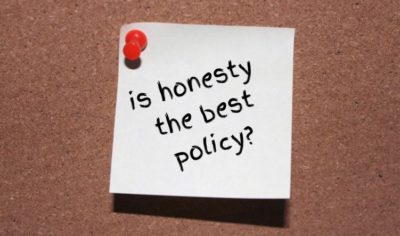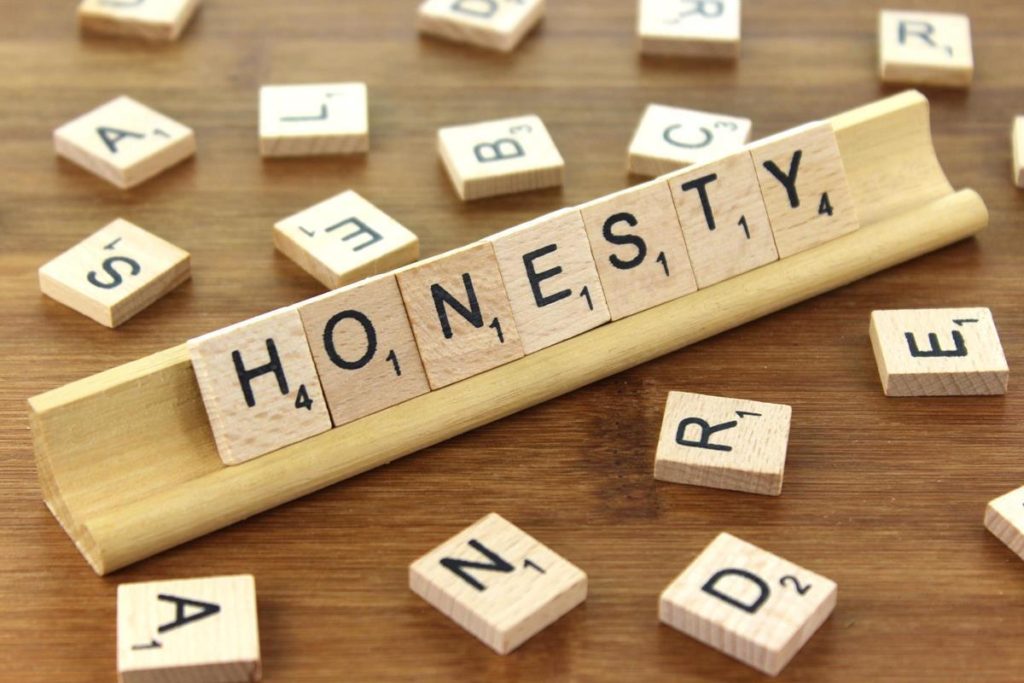
Is There Ever a Time for Dishonesty?
As a Christian, I grew up learning about the importance of honesty. My core book and church leaders taught how and why to be honest. They instructed that honesty is more than not lying. It is “truth telling, truth speaking, and truth living.” On the other hand, dishonesty is any form of deceitfulness–cheating, lying, stealing, and misleading. Dishonesty is the opposite of honesty.
Honesty is a principle. Principles are concentrated truths that serve as a foundation for our actions. They are natural laws that can’t be broken. Fortunately, because of agency we can choose how to apply the principle of honesty; and we will be held accountable for the choices we make.

There are several stories in literature and history in which people have chosen dishonesty over honesty. They believed the circumstances, or the perceived outcome of the situation, necessitated a lie.
One example occurs in the book Tom Sawyer by Mark Twain. Tom tells a lie to protect his girlfriend, Becky Thatcher. She had ripped a picture of the teacher’s, and Tom was the only witness. He knew that Becky would get punished when the teacher found out. As soon as the teacher started asking the students who had committed this misdeed, Tom bravely jumped up and confessed that it was he and took the punishment. Becky believed Tom to be “noble” and bragged about his actions to her father. Agreeably, Judge Thatcher said that it was “a noble, a generous, a magnanimous lie—a lie that was worthy to hold up its head and march down through history breast to breast with George Washington’s lauded Truth about the hatchet!”
In the true story Left to Tell, Immaculée Ilibagiza and several other Tutsi women were hiding in a tiny bathroom from Hutu soldiers during the horrible genocide in Rwanda. The Hutu pastor, whose bathroom they were hiding in, fabricated a story when the soldiers came looking for the hidden women. He lied to protect them. Immaculée never knew why, but she (and the reader) could assume it was because he knew the genocide was wrong and hiding the Tutsis was his way of fighting against that wrong.
Another example of a character being dishonest comes from The Hunger Games by Suzanne Collins. The main character, Katniss Everdeen lies about her affection for Peta because she believes it will get her the supplies she needs to win the games. The lives of her mother and sister, as well as her own, depend on her winning. She is deceitful because she thinks the end justifies the means.
“Honesty is the best policy” is an idiom that is found in many stories throughout history. These narratives that we’ve grown up hearing teach that honesty brings inner peace and trust from others. We learn that lying is a tangled web that is hard to break once we’ve started.
Coaching legend, John Wooden, learned early from his dad the meaning of honesty. One of his “Woodenisms” that he lived and coached by was: never lie, never cheat, never steal. He believed a person’s character was defined by their honesty; and others trust and follow you when you are honest.
The story of The Boy Who Cried Wolf is a perfect example of someone losing the trust of others because he chose to lie. A young shepherd boy was bored and several times cried “Wolf!” to get the attention of the villagers. After repeatedly answering the false call and seeing no wolf, they decided to stop running to the rescue. When there was really a wolf among the sheep, the villagers didn’t believe the cry for help. Because of his previous lies, they didn’t come running, and the shepherd boy and all his sheep are devoured by the hungry wolf.
Another story of honesty comes from American history. Nine-year-old John was a member of a pioneer handcart company. His father put a chunk of buffalo meat in the handcart and said it was to be saved for Sunday dinner. John was hungry and couldn’t resist the smell of the meat. Despite fearing the consequences, John cut off little pieces each day. When his dad asked if he had eaten some of the meat, John admitted that he had. Instead of giving the expected whipping or scolding, John’s father silently praised his son for his honesty. John’s father knew he could be trusted to tell the truth.
In The Hiding Place by Corrie Ten Boom, Corrie tells several stories of when God honored truth-telling. In one story, she is frustrated when she learned that her sister Nollie wouldn’t lie. When caught with a Jew, Nollie chose honesty, and admitted that the other woman was a Jew. The poor woman was taken and Nollie was imprisoned. Even though it seemed like bad news, Nollie believed no ill will would happen to the Jewish woman. Nollie had faith that God would not let her suffer because she chose to obey Him. Less than a week later, the Jewish woman was rescued. Corrie couldn’t believe that Nollie had been right.

Is the question of honesty based on the situation or is it a moral absolute (right no matter the circumstance)? Is there a time when it is acceptable to be dishonest or is honesty the only right answer? You decide.


